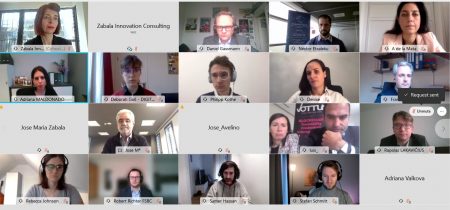This website uses cookies so that we can provide you with the best user experience possible. Cookie information is stored in your browser and performs functions such as recognising you when you return to our website and helping our team to understand which sections of the website you find most interesting and useful.
ERASMUS+ PROGRAMME
Bridging the gap between the educational sector and business through innovation
With a budget of over €28 billion, double that of the previous period, the new Erasmus+ work programme for 2021-2027 promises to be more inclusive, digital and green.

On 25 March, the European Commission adopted the new Erasmus+ 2021-2027 programme and budget. The new Erasmus + will receive 28.4 billion euros, with plans to expand existing programmes and introduce new ones. Erasmus+ will also support the resilience of education and training systems in the face of the pandemic.
The current budget has almost doubled as compared to the previous period 2014-2020. The new Erasmus+ programme offers study-abroad opportunities, traineeships, apprenticeships, and staff exchanges in all areas of education, training, youth and sport. It is open to students in secondary schools, higher education and vocational education students, adult learners, youth exchanges, youth workers and sports coaches.
“The fact that the Erasmus+ budget for the next seven years has almost doubled shows the importance given to education, lifelong learning and youth in Europe. Erasmus+ remains a unique programme in terms of its size, scope and global recognition, covering 33 countries, and accessible to the rest of the world through its international activities,” Commissioner for Innovation, Research, Culture, Education and Youth, Mariya Gabriel said
In addition to mobility, which counts for 70% of the budget, the new Erasmus+ also invests in bridging the gap between education institutions and the labour market. It provides companies with opportunities to cooperate with higher education and vocational education and training institutions in curriculum setting so as to ensure the future provision of skilled workers to operate in their relevant market sectors in future.
Features of the programme
The main features of the Erasmus+ 2021-2027 programme are:
- Inclusive Erasmus+: provides exchange opportunities to people from diverse cultural, social and economic backgrounds, and people living in rural and remote areas. It will be easier for smaller organisations, such as schools, youth associations and sports clubs to apply, thanks to small-scale partnerships and the use of simplified grants. The programme will also be more international, to cooperate with third countries, and expand to sport and the vocational education and training sectors.
- Digital Erasmus+: In the COVID-19 context, the education system has shifted to the digital form. Erasmus+ aims to help digital skills advancement in accordance with the Digital Education Plan. The new format will also allow short-term physical presence abroad, accompanied by teamwork and online learning. The programme will be digitalised with the implementation of the European Student Card.
- Green Erasmus+: In line with the European Green Deal, the programme will offer financial incentives to participants using sustainable modes of transport and also invest in projects promoting awareness of environmental issues.
- Erasmus+ for young people: DiscoverEU now becomes integral to Erasmus+ and grants 18 year-olds the possibility to get a rail pass to travel across Europe, learn from other cultures and meet fellow Europeans. Erasmus+ will also support exchange and cooperation opportunities for young people to actively participate in democratic life at the local, national and European levels.
Lastly, the Erasmus+ resilience effort will help accelerate new practices improve the quality and relevance of education, training and youth systems across Europe, at the national, regional and local level.
Zabala as a pathway towards EU skills development
At Zabala, we constantly monitor the latest developments and trends in European funding schemes to provide the best, tailor-made services to our clients. With over 35 years of experience working with businesses and public institutions to develop successful project proposals, we are ideally placed to find the right people to support your ERASMUS plus project and shape the skills of future generations. From small scale projects to develop inclusive education to large scale ones for upscaling workers across entire business sectors (like energy), we can help.



